Faculty News and Publications
Juan Álamo was invited this past July to participate at the virtual edition of the Patagonia International Percussion Festival – a prestigious percussion festival celebrated annually in Patagonia, Argentina. He also presented a master class and duo performance with Dr. Steve Anderson at the 2020 virtual edition of the Festival de Jazz en la Montaña – an international jazz festival celebrated annually in Cidra, Puerto Rico. His article “Harmonic and Rhythmic Structures in ‘Merlin’ Mvt. 2 – Time Away – an Introspective Analysis from the Performers’ Perspective,” is scheduled to be published in the December edition of the PAS-Percussive Notes Magazine. Due to COVID-19, the release of his two recording projects have been postponed to 2021. His solo marimba recording “Ensoñación/Reverie” is scheduled to be published by Summit Records in the summer of 2021 and his Salsa project album is scheduled to be released in the fall of 2021.
Allen Anderson composed three short piano pieces, Sevens and Eight, ChromaDia’tude, and Fifths In Line, bringing his collection of postludes to ten. He wrote four works for various combinations of wind and brass instruments: Fit for Starting, Elbow Room, All Around F, and Animaginary.
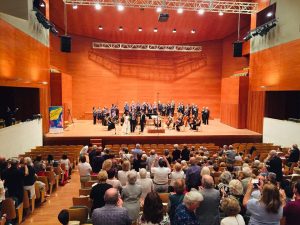
Stephen Anderson was scheduled for over 50 performances nationally and internationally in 2019-20. His seven-movement oratorio, Isaiah, received its European premiere by the Coral Shalom and Orchestra at the Musiquem Lleida! Festival Internacional de Música in Lleida, Spain and was the closing featured work at the festival. Anderson gave a composition masterclass during the festival, and the choir and orchestra traveled performing the oratorio again in cathedrals in Salsona and Agramunt, Spain. Anderson’s major new work, Concerto for Puerto Rico, for percussion solo and symphony orchestra, received its world premiere by the Orquesta Filarmónica de Cali, Maestro Germán Gutiérrez, Conductor and Dr. Juan Álamo, percussion soloist at the Festival Internacional de Percusión, Tamborimba in Cali, Colombia. Anderson also performed with Dr. Álamo’s Marimjazzia (Latin jazz ensemble) together with Puerto Rican and Colombian musicians, giving a second featured concert during the festival. Álamo and Anderson likewise performed with Marimjazzia at the Festival Internacional de Ensambles de Percusión in Costa Rica, this time with artists from Costa Rica and Venezuela.
The Dominican Jazz Project—an ensemble made up of some of the most respected artists in the Dominican Republic with Anderson serving as director, composer, and pianist—was the featured headliner at the Dominican Republic Jazz Festival in Sosúa, which is one of the largest and most significant jazz festivals in the Caribbean. The event was attended by the country’s Minister of Culture and other national leaders in the arts, and the festival subsequently released promotional material calling the Dominican Jazz Project “a national pride.” In conjunction with the festival, a two-part article was published in Jazz en Dominicana documenting Anderson’s collaborative work in the Dominican Republic. Likewise, as part of the festival, Anderson and members of the DJP also presented a masterclass for the FEDUJAZZ non-profit music education program to an audience of more than 300 students in local schools where students were invited on stage to perform with the group.
Anderson was a featured composer at the Marlin K. Jensen guest lecture series at the University of Utah, and on a separate trip, he was an invited guest at the Latter-Day-Saint Festival Retreat—a by-invitation retreat for film makers, film scorers, historians/authors, visual artists, composers, and popular music artists in Aspen Grove, Utah. Other events include performances with the North Carolina Symphony, serving as the featured guest at the WRAL First Night Raleigh with the Triangle Youth Jazz Orchestra, a performance by the Stephen Anderson Trio at the South Carolina Chamber Music Festival, serving as a guest speaker for various Carolina Public Humanities events, and participating in several educational outreach collaborative clinics given in North Carolina public schools. It’s Just Jazz KZFR 90.1 with DJ Steve Scarborough (in Chico, California) hosted a two-hour radio feature of Anderson’s recordings.
Finally, Summit Records released Anderson’s seventeenth CD publication since arriving at UNC in 2005—Jason Foureman and Stephen Anderson, Duo—which is now receiving airplay on jazz radio stations nationally and has been reviewed in Jazz Weekly and Musical Memoirs.
 Andrea Bohlman published Musical Solidarities: Political Action and Music in Late Twentieth-Century Poland (Oxford University Press 2020). In September 2020, she was awarded the Phillip and Ruth Hettleman Prizes for Artistic and Scholarly Achievement by UNC-CH. She spoke at the annual meetings of the American Musicological Society and the Society for Ethnomusicology, as well as at the biennial meeting of the Society for Cultural Anthropology and at the University of Bonn. These talks build on the research she has undertaken for a new book on the history of tape recording—as a creative practice, a means of academic research, and a mode of tuning one’s ears to the environment.
Andrea Bohlman published Musical Solidarities: Political Action and Music in Late Twentieth-Century Poland (Oxford University Press 2020). In September 2020, she was awarded the Phillip and Ruth Hettleman Prizes for Artistic and Scholarly Achievement by UNC-CH. She spoke at the annual meetings of the American Musicological Society and the Society for Ethnomusicology, as well as at the biennial meeting of the Society for Cultural Anthropology and at the University of Bonn. These talks build on the research she has undertaken for a new book on the history of tape recording—as a creative practice, a means of academic research, and a mode of tuning one’s ears to the environment.
Mark Evan Bonds gave an invited lecture in February 2020 at the international “Beethoven-Perspektiven” conference at the Beethoven-Haus in Bonn marking the 250th anniversary of the composer’s birth. His talk (“Fantasieren, Komponieren, sich-selbst ausdrücken”) examined the relationship of improvisation, composition, and self-expression. Other Beethoven lectures, for conferences in Schwetzingen, Vienna, and Boston, were canceled because of the pandemic. His books The Beethoven Syndrome: Hearing Music as Autobiography and Beethoven: Variations on a Life, both published by Oxford University Press, appeared in 2020. He is currently at work on a history of musical listening since the Enlightenment.
Marc Callahan, even amidst lockdown, has been busy working as a performer, director, and songwriter. Last season, he performed the role of Hannah Before in Laura Kaminsky’s opera As One with Carolina Performing Arts, marking the opera’s debut in the Carolinas. As an advocate of opera for social justice, this opera tells one transgender woman’s come-of-age tale. This production paid homage to the many trans people, especially black trans women, who have been murdered in hate crimes in North and South Carolina. As a director and dramaturge, he completed a residency with Meredith Monk at the Omega Institute and began work with UNC Opera to devise a narrative that would accompany Monk’s opera ATLAS. To this end, he has worked with his students, UndocuCarolina, the UNC Latinx Center, artist Susan Harbage Page, and puppeteer “Jeghetto” to tell a story about one family’s journey from El Salvador to the U.S. border as asylum seekers. The students had the opportunity to workshop with Meredith Monk’s ensemble members during a campus visit in March and performed a series of “vocal rooms” as a pre-show exhibit for Monk’s Cellular Songs. ATLAS is supported by a generous grant from the National Endowment for the Arts. Continuing his work as a resident director at the Miami Classical Music Festival, he debuted a series of virtual workshops, masterclasses, and opera scenes over the summer alongside acclaimed colleagues such as Dolora Zajick and Eglise Gutiérrez. He was recently named winner honorable mention for the prestigious Charles C. Reilly Director’s Prize for his production of Kurt Weill’s Der Jasager. He has also participated in a series of residencies where he has been writing songs for a new music-theater piece entitled A GOOD BOY by author Lynden Harris. Their work has recently passed to the second round of submissions for the O’Neill National Musical Theater Conference.
Tim Carter presented keynote addresses, etc., at conferences at the Yale Institute of Sacred Music (Hearing Emotion’s Histories: Interdisciplinary Perspectives on Sacred Music and the History of Emotions), the Universität für Musik und darstellende Kunst, Vienna (Cantare nel gravicembalo: Ensemble- und Begleitpraxis in der italienischen Musikkultur um 1600), and the University of Massachusetts at Amherst (Tasso in Music). He was a visiting Class of 1960 Fellow at Williams College, Mass. His latest book, Staging “Euridice” (1600): Theatre, Sets, and Music in Late Renaissance Florence (co-authored with the Florentine theater historian, Francesca Fantappiè), is currently entering production with Cambridge University Press (forthcoming).
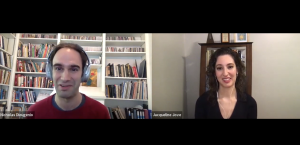
Nicholas DiEugenio, violinist and Associate Professor of Music, continues to seek out innovative ways to engage listeners across the globe. A core member of the award-winning, New York-based ensemble The Sebastians, Nicholas curated one of the group’s programs during the 2019-20 concert season which juxtaposed the contemporary poetry of Kimiko Hahn with music of Francois Couperin. Committed to various forms of period performance and research, Nicholas can be heard as part of an international cast, Accordes, which releases its first album in Fall 2020. Recorded last year at the University of Oxford, the album is part of a research and performance project on 19th Century performance styles led by violinist Claire Holden and musicologist Eric Clarke. This past summer, Professor DiEugenio recorded all six Sonatas and Partitas for Solo Violin by J.S. Bach. Creating the virtual series Alone/Engaged, Nicholas released these live video performances in Fall 2020, which are coupled with interviews of musical advocates for social justice, including 2018 MacArthur Fellow Vijay Gupta. Having directed the first virtual edition of the Luby Violin Symposium in May 2020 with participants and guest artists from across the U.S., Spain, and Finland, Nicholas worked collaboratively to incorporate QiGong and meditation practices in fostering this online musical learning community.
Evan Feldman, In September 2020 Professor Feldman led a concert in the Auditorio Nacional de Música with piano soloist Clara Yang and the Banda Sinfónica Municipal de Madrid, the professional wind band of Madrid, Spain. He traveled back to Spain in November to present at the conference La innovación de las Agrupaciones Musicales and to conduct a concert with the Valencia Youth Wind Ensemble. Professor Feldman’s international activities continued in Milan, Italy, where he led masterclasses for conductors at the Conservatorio di Milano. He also assumed editorship of the WASBE Journal, a publication of the World Organization of Symphony Bands and Ensembles.
Domestically, in January 2020 Professor Feldman was a featured clinic conductor at the Hodgson School of Music’s (University of Georgia) JanFest. In February 2020 he conducted the 11-12 grade honor band in Region 5 of the South Carolina Band Directors Association.
This was Professor Feldman’s third year as Principal Guest Conductor of the Greensboro Symphony Orchestra (Greensboro’s only professional orchestra), with which he conducted education and holiday concerts and two shows as part of the Tanger Outlets POPS series: Broadway and Beyond, with Ben Crawford; and The Paul Simon Songbook, featuring Paul Loren.
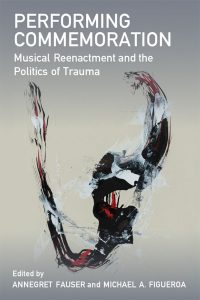 Michael Figueroa spent his summer serving as a mentor in UNC’s Moore Undergraduate Research Apprentice Program (MURAP), where he worked with two undergraduate students to carry out individual research projects: one focused on Syrian American rapper Mona Haydar (by UNC music major Sophia Rekeibe) and the other focused on The Wiz (by Chloë Jackson of Spelman College). He also completed several of his own writing projects. Along with colleague and co-editor Annegret Fauser, he published A Performing Commemoration: Music and the Politics of Commemoration, an edited volume appearing on the “Music and Social Justice” series of the University of Michigan Press. The book developed out of an academic conference sponsored by the department in April 2017 and includes colleague Andrea Bohlman among its illustrious contributors. Figueroa also published an article based on his teaching experience at UNC, entitled “Decolonizing ‘Introduction to World Music’?,” in the American Musicological Society’s Journal of Music History Pedagogy. Unable to travel for research due to COVID-19, he spent time completing several other writing projects, most significantly his monograph City of Song: Music and the Making of Modern Jerusalem, which will be published by Oxford University Press in 2021.
Michael Figueroa spent his summer serving as a mentor in UNC’s Moore Undergraduate Research Apprentice Program (MURAP), where he worked with two undergraduate students to carry out individual research projects: one focused on Syrian American rapper Mona Haydar (by UNC music major Sophia Rekeibe) and the other focused on The Wiz (by Chloë Jackson of Spelman College). He also completed several of his own writing projects. Along with colleague and co-editor Annegret Fauser, he published A Performing Commemoration: Music and the Politics of Commemoration, an edited volume appearing on the “Music and Social Justice” series of the University of Michigan Press. The book developed out of an academic conference sponsored by the department in April 2017 and includes colleague Andrea Bohlman among its illustrious contributors. Figueroa also published an article based on his teaching experience at UNC, entitled “Decolonizing ‘Introduction to World Music’?,” in the American Musicological Society’s Journal of Music History Pedagogy. Unable to travel for research due to COVID-19, he spent time completing several other writing projects, most significantly his monograph City of Song: Music and the Making of Modern Jerusalem, which will be published by Oxford University Press in 2021.
Jeanne Fischer had a busy year continuing her work as Area Head of Voice. Her research and performance focused on women’s musical contributions. In the Fall, she and Mimi Solomon gave a recital of songs by Pauline Viardot, Clara Schumann, Fanny Hensel, and Cécile Chaminade. In February, she performed a lecture-recital on Madama Europa di Rossi, the first known Jewish female professional singer. This recital was part of the NC HIP Festival and featured cellist Brent Wissick, harpsichordist Jacqueline Nappi, and two recent UNC Voice alumni, Shafali Jalota and Anne Sutton.
Tonu Kalam led the UNC Symphony Orchestra, which was fortunate to be able to present a major concert in the Carolina Performing Arts series just weeks before the university transitioned to online instruction due to the pandemic. On February 25 they were joined by Metropolitan Opera star mezzo-soprano Isabel Leonard as soloist, whose magnificent singing in works by Ravel, Gounod, Berlioz, and Bizet inspired the orchestra members as well as the appreciative audience. In December 2019 student concerto competition winners soprano Lila Dunn, baritone Bradley Barefoot, and pianist Cody Qiu, along with guest conductor Vincent Povázsay (BMus 2014), appeared with the orchestra in a program that also featured the world premiere performance of Taiga by Durham composer Maxwell Ramage.
Mark Katz, in the Before Times, was maintaining a busy travel schedule, giving lectures on hip hop and music technology in Bolivia, Jordan, Mongolia, Norway, and Sweden. In March 2020, he accompanied two UNC undergraduate students on a cultural exchange program in Cochabamba, Bolivia; they managed to return to the United States before everything shut down. Over the summer, Mark moderated (with Junious Brickhouse) a series of online conversations with hip hop artists in a series called Next Level Live! and served as a panelist in two public forums on race. His article, “Listening to Recorded Sound,” was published in the collection, The Bloomsbury Handbook of Music Production, in February 2020.
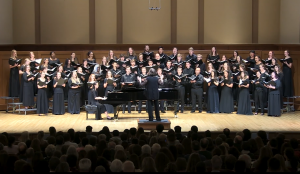
Susan Klebanow, while on leave for the spring semester, served as guest instructor and conductor at San Diego State University, where she taught graduate seminars, conducting lessons, and conducted the SDSU Concert Choir and Chamber Chorus. She was invited to teach and conduct at the Souchow School of Music in Shanghai as well as The University of Lleida in Barcelona, but sadly had to cancel both trips because of the pandemic. On campus in the fall she conducted Carolina Choir in the world premiere of Songs of War, a 6-movement cantata by Kenneth Frazelle set to the wartime poetry of Paul Green. Also featured on the Peace, War, and Remembrance program was the world premiere of Peter Lurye’s Remember, performed by the UNC Chamber Singers. Klebanow was guest soprano and pianist on Brent Wissick’s faculty recital in Moeser Auditorium, and performed as pianist in the IAH’s Memorial Concert for Ruel Tyson. She continues to serve as soprano and harpsichordist with Ensemble Matiz.
Michael Kris was busy in the fall with concerts and master classes throughout the southeastern United States. During the 2019/20 academic year, he was a Bacca Fellow at Duke University. The Bacca Fellowship supports research focused on innovative undergraduate teaching and new course development. In December, he performed Advent concerts with the Washington Cornett and Sackbut Ensemble and completed a recording project with Duke University Chapel Choir titled Marvel of the Season. The live concert production was broadcast nationally on December 24 on the CBS network. In recognition of his work with undergraduates at UNC, he received the Chapman Family Teaching Award in March. In June and July, he taught and performed virtually at the 59th season of the Eastern Music Festival.
Stefan Litwin Despite the restrictions due to the global pandemic, Stefan Litwin has maintained an active international schedule with concerts, lecture-recitals and masterclasses (live and digitally streamed.) The Max-Planck-Institute for Empirical Aesthetics Frankfurt, for example, produced two live events (“Beethoven’s Piano Sonata op. 101” and “New Listening”) which can now be viewed on YouTube.
Stefan Litwin’s music-theatre Flegeljahre, based on the 19th century novel by Jean Paul and composed for renowned German actor Ulrich Noethen and the GrauSchumacher Piano Duo, will be presented as part of the Musikfestspiele Saar in May 2021. (Originally, the premiere had been set for May 2020.) Currently, Stefan Litwin is dedicating much of his time to writing his second opera on a play by Peter Weiss. Commissioned by the Staatstheater Braunschweig, Germany, the work Wie dem Herrn Mockinpott das Leiden ausgetrieben wird will be premiered in March 2022.
Anne MacNeil’s published three essays this year:
“Songs for Isabella d’Este” in Uncovering Music of Early European Women (1250-1750), edited by Claire Fontijn. New York: Routledge, 2020;
“ ‘I’ve said too much’: Canon Antonio Ceruto’s descriptions of music and theater in Mantua, 1567,” in A carte scoperte: Nei 150 anni dell’Archivio di Stato di Mantova, edited by Roberta Piccinelli, Deanna Shemek, and Luisa Onesta Tamassia. Milan: Silvana Editoriale, 2019;
“A Voice that Cries in the Wilderness: Issues of Authorship, Performance, and Transcription of the Italian frottola,” special issue of The Italianist, edited by Jessica Goethals and Eugenio Refini.
Her most recent film, Sovra i Verdi rami cantando: Echoes of Serafino Aquilano, premiered last fall and may be viewed anytime at https://isabelladeste.web.unc.edu/idea-video-archive/.
 On top of it all, this has been a particularly intense creative year for Anne’s 3D virtual reality project, The Virtual Studiolo, which is just now concluding Phase 1 production and entering a period of reflection, analysis, and beta-testing. Please see the project demo Anne created, which she shared at the annual meeting of the American Musicological Society on November 7. https://storymaps.arcgis.com/stories/54830bcfdb9f4c878d05d8cbe21cf4c3
On top of it all, this has been a particularly intense creative year for Anne’s 3D virtual reality project, The Virtual Studiolo, which is just now concluding Phase 1 production and entering a period of reflection, analysis, and beta-testing. Please see the project demo Anne created, which she shared at the annual meeting of the American Musicological Society on November 7. https://storymaps.arcgis.com/stories/54830bcfdb9f4c878d05d8cbe21cf4c3
The Virtual Studiolo’s project team includes Anne and her fellow co-director Deanna Shemek (University of California, Irvine), the scientific team from the Visualization Information and Technology Laboratory (VisitLab) at the CINECA Inter-University Supercomputer Center in Bologna, the Kunsthistorisches Museum in Vienna, and the Musée du Louvre in Paris. Together, they are bringing to life the legendary studiolo and grotta of Isabella d’Este, re-populating these rooms with Isabella’s collections of books, music, and artworks to create a virtual space for both research and enjoyment. The last time the artworks in Isabella’s collections inhabited these rooms together was in 1542. The project is currently funded by a two-year grant from the National Endowment for the Humanities.
Jocelyn Neal is serving as a workshop consultant for high school AP music theory teachers across the country this year, and expanding her research into the best ways for new undergraduate music theory curricula to meet the needs of today’s students. Her current book project addresses copyright and songwriting; she continues to grow the UNC Bluegrass Initiative; and she is serving as an executive officer with the Society for Music Theory.
Timothy Sparks spent the summer of 2019 in Italy teaching and performing with the International Young Artists Program throughout Tuscany in Italy. Featured performances include directing an opera scenes program in Monte San Savino and Cortona as well as performing on the XVI Festival di Musica Sacra in the Cattedrale di Cortona and the Basilica del Sacro Cuore di Gesù in Rome. Locally, Sparks performed with North Carolina Opera in their production of Carmen, was the tenor soloist for a Bach program featuring Cantata 10 (Meinen Seel erhebt den Herren) and Magnificat with the Sounds on Oberlin concert series in Raleigh, NC, and presented selections from Saul by G. F. Handel for the N.C. Museum of Art, commemorating the acquisition of William Story’s marble masterpiece, King Saul.
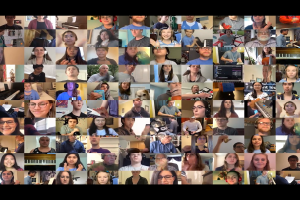
Lee Weisert used the time off from performances and collaborations to work on his second album of original compositions, which is expected to be completed in early 2021. The album, entitled Recesses, will consist of three new electroacoustic compositions, with contributions by UNC faculty Allen Anderson, Nicholas DiEugenio, Melissa Martin, and Matthew McClure. During the COVID-19 shutdown, he collaborated with UNC professor Evan Feldman to create Carolina Stomp!, a virtual video arrangement of Hark the Sound that compiled over 100 videos submitted by UNC students, alumni, faculty, and staff. Several upcoming performances and sound installation projects are anticipated in the immediate post-virus era.
 Brent Wissick As it has for so many, the Pandemic has had a profound effect on Brent Wissick’s activities, but the year got off to a good start in the summer of 2019 with trips to Houston, TX to mentor young viola da gamba players for the Viola da Gamba Society of America at a special meeting for that age group. Later in the summer he taught and performed at the National Conclave of the VdGSA in Oregon. A year later, the 2020 Conclave that was to be held in Ohio, was instead held virtually because of COVID but during the final session he was awarded the honor of a Lifetime Membership.
Brent Wissick As it has for so many, the Pandemic has had a profound effect on Brent Wissick’s activities, but the year got off to a good start in the summer of 2019 with trips to Houston, TX to mentor young viola da gamba players for the Viola da Gamba Society of America at a special meeting for that age group. Later in the summer he taught and performed at the National Conclave of the VdGSA in Oregon. A year later, the 2020 Conclave that was to be held in Ohio, was instead held virtually because of COVID but during the final session he was awarded the honor of a Lifetime Membership.
During June of 2019, Wissick traveled with a group of UNC Alums throughout Czech and Germany, visiting sites important to music in those areas, serving as a lecturer. During Fall 2019 there were concerts of Magnolia Baroque in Winston-Salem and of Handel’s Saul at the North Carolina Museum of Art, joined by UNC voice colleagues Marc Callahan and Tim Sparks. In October and November, he played two Department concerts on which he was a cello soloist, joined by many other colleagues: one of French Romantic music joined by Mimi Solomon and Nicholas DiEugenio; and another of important 20th century solo cello music (including one by Allen Anderson) joined by singers Jeanne Fischer and Susan Klebanow as well as the UNC Cello Choir. Those cello students were lucky to also have 3 master classes with guest artists in the Fall term. One did a senior recital in November, but the planned junior recital for Spring had to be presented online.
January and February included many concerts of viola da gamba music for Wissick: a solo recital in Chapel Hill, one of vocal music with Jeanne Fischer; one for Dallas Bach Society and 3 concerts on the NC HIP Festival. By March of course the cancellations began, including trips for concerts and guest teaching in Australia, Korea, Poland and Arizona. But teaching on Zoom continues with enrolled UNC students and for a number of local and national organizations. Having completed a 3 year term as Associate Chair for Performance, Composition and Music Education in June 2020, he looks forward to returning to concerts when life returns to some version of normal.
Clara Yang’s activities this year continued to have a global focus. She performed Rhapsody in Blue with Evan Feldman guest conducting the Banda Sinfónica de Madrid in the prestigious Auditorio Nacional de Musica in Madrid, Spain. In Jan 2020, she performed world-renowned composer Chen Yi’s piano concerto, which was written for her, with the Sichuan Symphony Orchestra under the direction of the renowned Spanish conductor Josep Caballe Domenech in Chengdu, China. In February 2020, she performed with the acclaimed trans baritone Lucia Lucas on the Carolina Performing Arts series. Another highlight was performing a solo recital at the Texas State International Piano Festival.
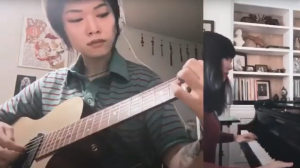
Since March, Dr. Yang has been doing many virtual projects with artists in the States and abroad, such as a Cross-genre collaboration with the influential and groundbreaking rock guitarist Yvette Young. This video was shown as a part of the Global Young Musicians’ Concert on the Beijing Media Network. She collaborated with Chinese-American composer Phil Young and cellist Daming Li for a video project of a newly composed piece named Consolation, dedicated to people who are suffering during the COVID-19 pandemic. This video performance was broadcast on the major California Bay Area classical music radio station KDFC. She was interviewed and her video was featured at the National Civic Leadership Forum organized by the Asian American Unity Coalition. In addition, she collaborated with the London-based concert pianist Yuki Negishi for a video project of a piano duo piece. This video has been published by the London based “Black Dress Code Concert Hall.”
Faculty Publications
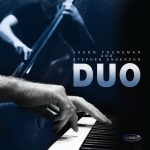 Stephen Anderson
Stephen Anderson
With Jason Foureman. Duo. Summit Records. 2020.
Andrea Bohlman
“Overwriting Sound: Polish Commemoration in Concert.” In Performing Commemoration: Musical Reenactment and the Politics of Trauma, edited by Annegret Fauser and Michael A. Figueroa.
Musical Solidarities: Political Action and Music in Late Twentieth-Century Poland. New York: Oxford University Press, 2020.
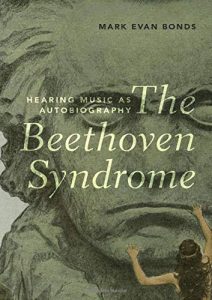 Mark Evan Bonds
Mark Evan Bonds
The Beethoven Syndrome: Hearing Music as Autobiography. New York: Oxford University Press, 2020.
Beethoven: Variations on a Life. New York: Oxford University Press, 2020.
“Heart to Heart: Beethoven, Archduke Rudolph, and the Missa Solemnis.” The New Beethoven: Evolution, Analysis, Interpretation, 228–43. Ed. Jeremy Yudkin. Rochester, NY: University of Rochester Press, 2020. (Eastman Studies in Music)
“Report: Eighth International New Beethoven Research Conference, Boston, 30-31 October 2019.” Eighteenth-Century Music 17/2 (2020): 300–02.
“Hanslick and Leibniz.” In Hanslick im Kontext: Perspektiven auf die Ästhetik, Musikkritik und das historische Umfeld von Eduard Hanslick / Perspectives on the Aesthetics, Musical Criticism, and Historical Setting of Eduard Hanslick, 21–30. Ed. Alexander Wilfing, Christoph Landerer, and Meike Wilfing-Albrecht. Vienna: Hollitzer, 2020
Tim Carter
“Oklahoma!”: The Making of an American Musical. Revised edition. New York: Oxford University Press, 2020.
“Broadway Goes to War.” In Music and World War II. Edited by Christina Baade, Roberta Montemorra Marvin, and Pamela Potter, 131–47. Bloomington: Indiana University Press, 2020.
 Annegret Fauser
Annegret Fauser
With Michael Figueroa. Performing Commemoration: Musical Reenactment and the Politics of Trauma. Michigan: University of Michigan Press, 2020.
Michael Figueroa
With Annegret Fauser. Performing Commemoration: Musical Reenactment and the Politics of Trauma. Michigan: University of Michigan Press, 2020.
“Decolonizing ‘Introduction to World Music’?.” In Journal of Music History Pedagogy, 10, No. 1, (2020)
Jason Foureman
With Stephen Anderson. Duo. Summit Records. 2020.
Mark Katz
“Listening to Recorded Sound.” In The Bloomsbury Handbook of Music Production. Edited by Simon Zagorski-Thomas and Andrew Bourbon. London: Bloomsbury Publishing, 2020.
Anne MacNeil
“Songs for Isabella d’Este” also appeared this year in Uncovering Music of Early European Women (1250-1750), edited by Claire Fontijn. New York: Routledge, 2020.
“I’ve said too much’: Canon Antonio Ceruto’s descriptions of music and theater in Mantua, 1567,” in A carte scoperte: Nei 150 anni dell’Archivio di Stato di Mantova, edited by Roberta Piccinelli, Deanna Shemek, and Luisa Onesta Tamassia. Milan: Silvana Editoriale, 2019.
“A Voice that Cries in the Wilderness: Issues of Authorship, Performance, and Transcription of the Italian frottola,” special issue of The Italianist, edited by Jessica Goethals and Eugenio Refini.
